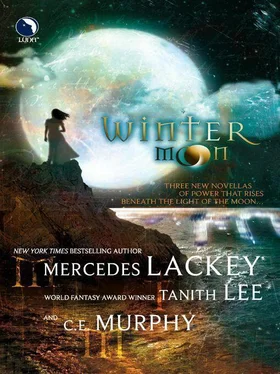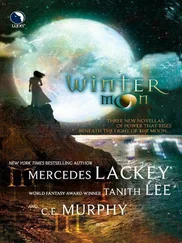There under the sun-sparkling pines, she wrestled Tuyamel and Vlis, and threw them both, and hugged them all. They danced about there, laughing, embracing, loud and boisterous as eleven-year-olds.
Next day they reached the shore and rowed out to the galley. By sunfall they were on the way to Amnos, and life as they remembered it.
Epilogue
Paper
The windblown sky was full of birds that morning.
Summer had stayed late in Amnos, giving way at last to a harsh, bleached winter.
Now spring tides freshened the coast, and men and beasts were casting the torpor of the cold months.
Clirando had been with Eshti, her old servant woman, to the fish market, and coming back Eshti bolted straight to the kitchen with her prizes. Clirando climbed up to the roof of her house. She was watching the antics of the house doves circling over the courtyard trees.
And out of her inner eyes, from nowhere, Araitha came, and stood silent in her mind. Clirando recalled how she had stood in the yard too laying her curse, then turning away from shadow to light to shadow—or had it been light to shadow to light….
Unlike her companion, her dream lover, Clirando had had no dialogue with her dead friend to set anything right between them.
Araitha therefore might always haunt her. No longer injurious, only bitter. It could not be helped. At least her curse was spent.
All winter Clirando had carried on her life as she had in the past. If her mood was sometimes uneven, she hid it. Mourning the loss of a dead comrade was one thing, but to mourn the loss of someone who had not been real was wretched and bewildering. Sometimes she even mocked herself. But now—now it was spring.
Clirando turned. Eshti had come up on the roof, puffing from the steps, wiping fish scales off on her apron.
“What now?” Clirando inquired. “Has dinner swum away?”
“No, lady. The priestesses of Parna have sent for you.”
Clirando’s thoughts scattered apart and back together in concern. She sprang downstairs to fetch her cloak.
In the shrine by the main temple hall, one of the two priestesses who received Clirando was the middle-aged woman who had dispatched her to the Isle.
Clirando saluted both of them. She said, “Have I committed some error, Mothers?”
The two of them gazed at Clirando. Only the older priestess smiled. “Not at all. There are matters which have just come to our attention. Now spring has driven the ice from the harbors, ships are moving, and letters have arrived in Amnos.”
Clirando nodded. Though familiar with books, she had seldom seen a letter. Next moment she saw two. Normally they would be of folded cloth, written on, then waxed, Both of these letters were of fine paper, made from Lybirican reeds.
“A ship’s captain brought them here this morning,” said the other priestess. “One is for you, Clirando. The other—”
“The other was sent to us by one of the Wise Women of Moon Isle. She is over a hundred years of age, but she lives sometimes in a hut on a headland, and still she weaves cloth, for her eyes stay clear and her fingers agile.”
“I met her,” said Clirando. She checked. “Or thought I did.”
“The Wise Woman—she has no other name—says that something has come to her notice about a warrior girl, Clirando she is called, who was sent to the Isle to work out some inner tussel. The gods allowed her the trance of profound sleep which the Isle can give, and in the sleep various adventures, by means of which her trouble was healed. However,” the priestess paused. And Clirando’s heart paused within her. “It seems, during this time, Clirando showed strong evidence of being herself a healer and a spiritual guide.”
Shocked, Clirando interrupted. “ No, Mother—I did nothing like that—”
Ignoring her, gently the priestess went on, “Although personal experiences on the Isle are not generally spoken of, there are two exceptions to this rule. Firstly, as perhaps you will guess, anyone may speak in secret to a priest of their own experience. This recital may naturally include mention of others who have—or who have seemed to have—been part of it. The priests, though they will answer no direct question, will nevertheless, should it be needful, afterwards pass on any insight to those others who have shared the event, providing, and this is the second exception, the insight is sufficiently profound. And so: A man, a soldier formerly with the Rhoian legions, reported the events to the Temple of the Father on the Isle. He too had been sent there to work out some penance and guilt and sorrow, and he too had the god’s trance fall on him. The priests cared for him in this sleep, as it is always done, just as the priestesses cared for you, Clirando. But when he woke, he had an unusual story to tell. It seems he found himself in a forest, and there he met a young woman, who engaged his interest at once, being, he freely says, for him the perfect type of woman, both a warrior and a girl of great grace.” The priestess smiled again, peered into one of the paper letters, and read aloud: “‘Also blessed with a passionate clear mindedness.’” The priestess allowed the letter to fall closed once more. “It seems too, that in this dream he had, and which apparently he shared with her, the woman he describes so admiringly—and whose name he gives as Clirando—that she gave him to understand she was not averse to his person. At the conclusion of their journey, she assisted him further, guiding him forward, as he describes, through a magical gateway, and so on to the mystic plains of the moon itself. Here his own difficulty was resolved, but once again Clirando remained at his side, helping him always. Now, we hear of visits to the moon, which may happen on the Isle—how else did it come by its name?—but they are rare. He insists that, had it not been for the woman, he himself would never have got there, and so never confronted what he must. Finally, when all was done, she—” the priestess again consulted the paper “—summoned a path of stars and led him home by that route to the world. But—to his horror—he lost her on the way.” The priestess folded the paper into her sleeve. She looked at Clirando. “Do you know anything of this?”
Clirando could not speak.
Then words came. “He is called Zemetrios?”
“So he is. I note your heart is full of love for him. That is the Maiden’s gift to you, then. But it takes much more than love alone to work the magic you have done, my girl. And so it transpires the Maiden gave you another gift, too. For you are a healer and guide, as he has said. No, don’t shake your head. Of course you have made mistakes and blunders on this occasion. It was your first excursion into such realms. You will need training, as tough and demanding as any you’ve known in the fighter’s art. You stumbled on your gift, which till now you never knew you had. But this man Zemetrios is no fool. He insists you possess psychic powers. He has convinced the Wise Women. That’s enough for us. Such talents must never be denied.”
“Then—”
“Then, as I’ve said, you shall be taught. You will still be a warrior, but to one trade will be added another.”
“But—Mother—I—”
“Now, sit on the bench there and read this second letter, which has come only for you. The ship’s captain has said he wishes a moment with you then. He’s in the Little Fountain Courtyard. No doubt he expects to be rewarded for bringing such costly paper all this distance.”
Clirando found she had sat down. She sat with the second letter unopened. All she could see or think was filled only by one face, one name. He was real, he lived, and knew her. She had guided him unknowing through forest and mountain and otherworld, her lover, her beloved, Zemetrios. And their lovemaking—though experienced in a dream—had in some manner taken place, for both. Yet now—he mentioned nothing of meeting her again—
Читать дальше











